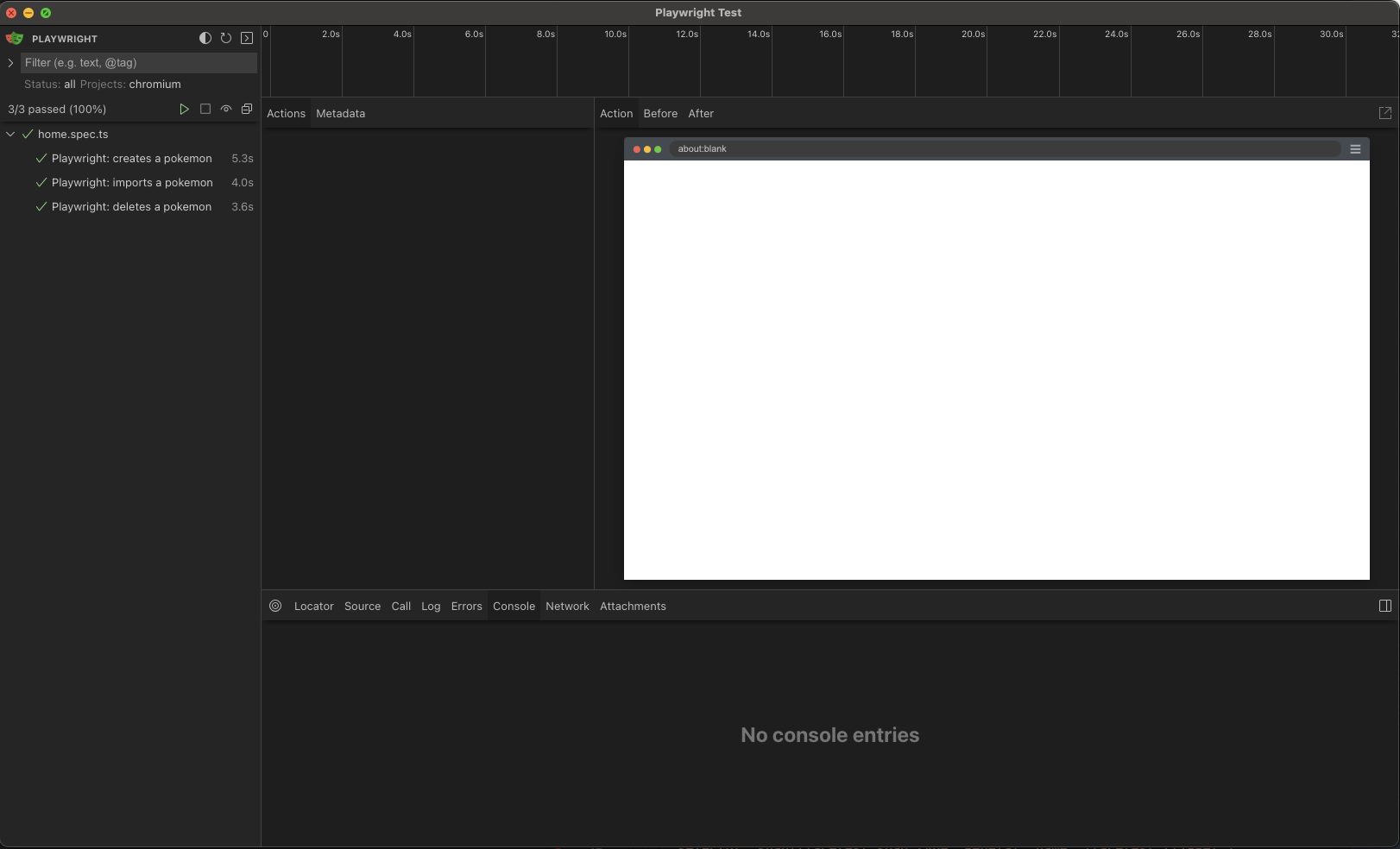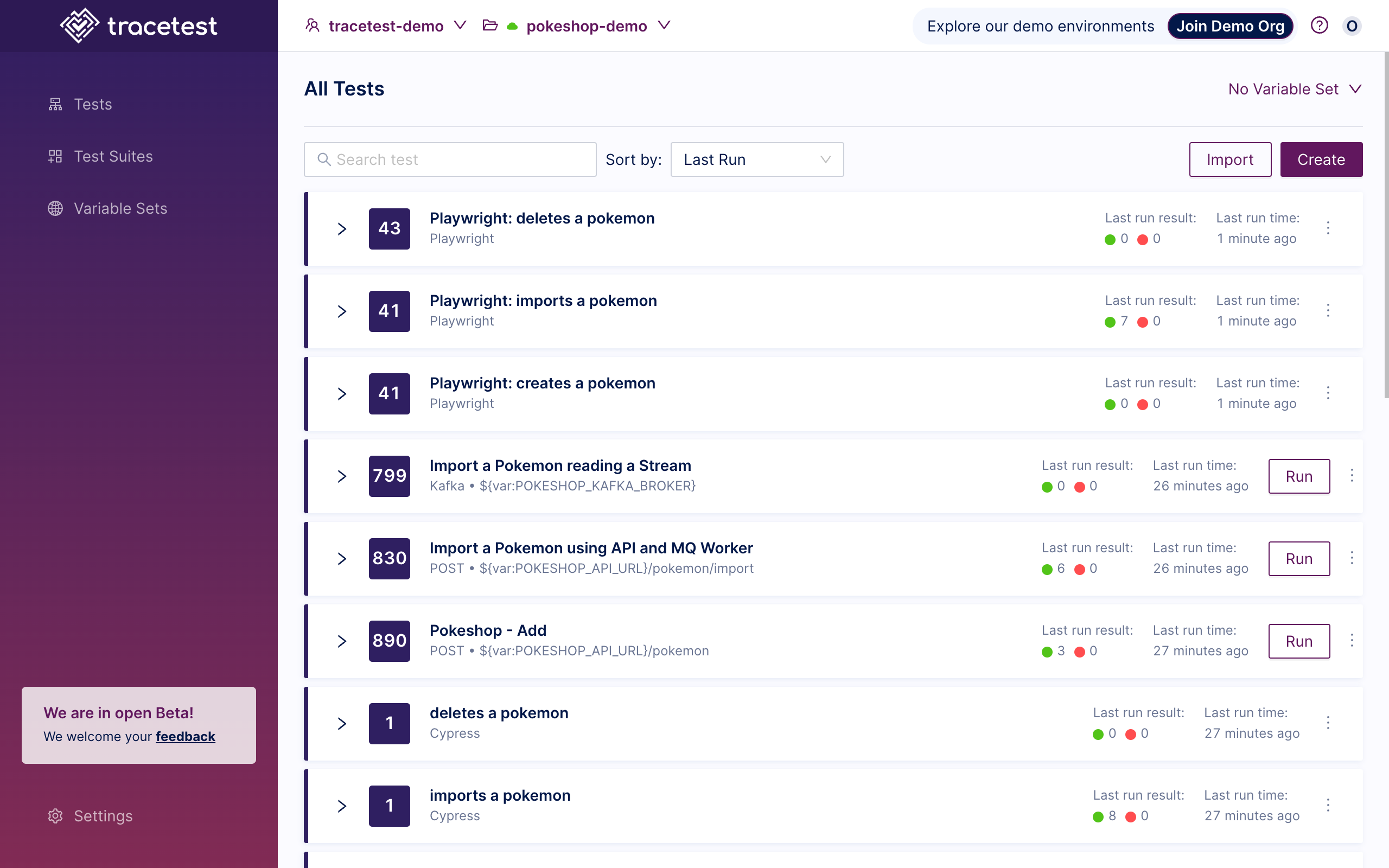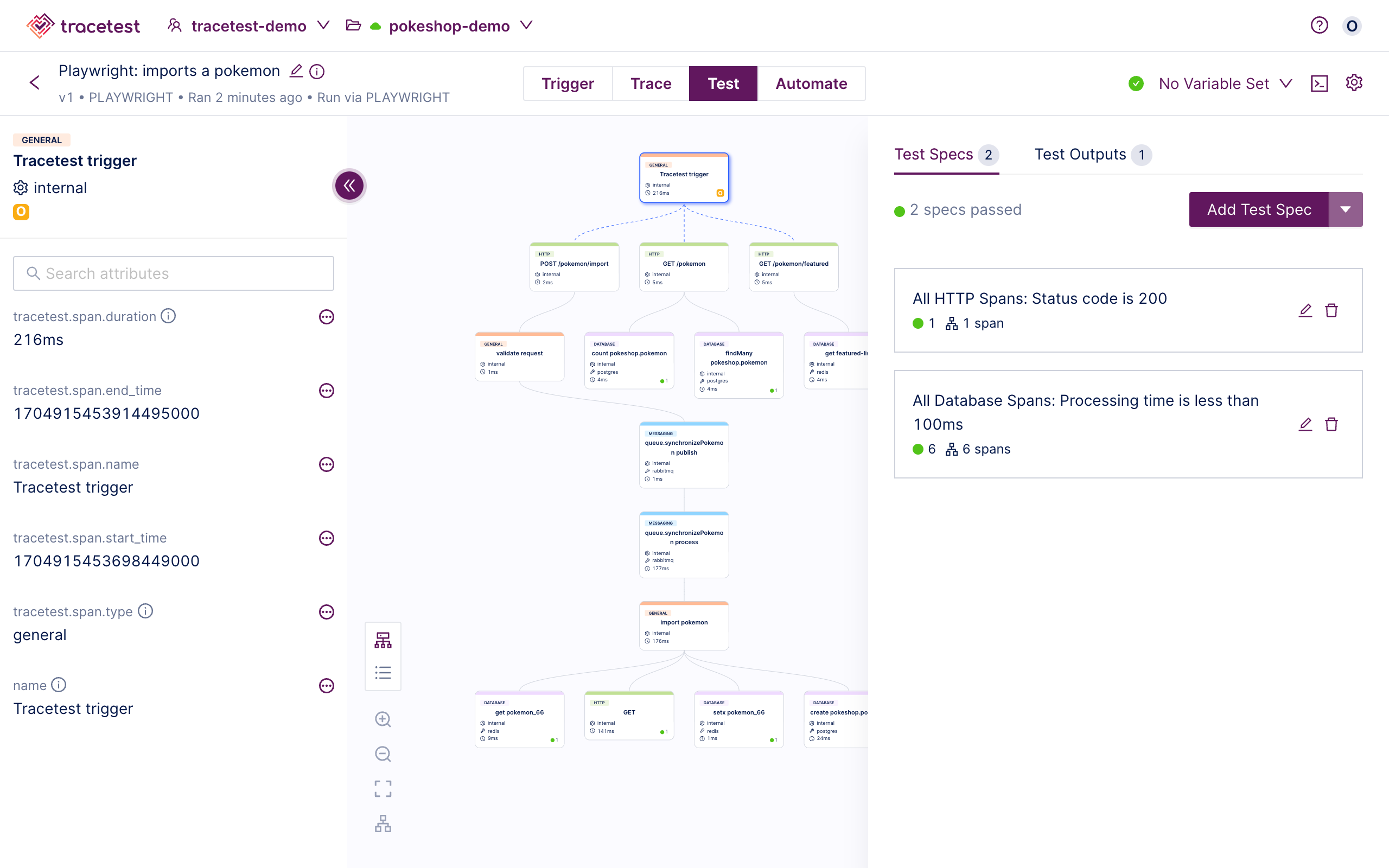Trace-Based End to End Testing with Playwright and Tracetest
Find out the requirements for your instrumented app to start using Tracetest x Playwright.
Tracetest is a testing tool based on OpenTelemetry that permits you to test your distributed application. It allows you to use the trace data generated by your OpenTelemetry tools to check and assert if your application has the desired behavior defined by your test definitions.
Playwright is an open-source automation framework developed by Microsoft that enables cross-browser automation for web applications. It provides a set of APIs and libraries for automating interactions with web browsers such as Chrome, Firefox, and Microsoft Edge.
Why is this important?
The Tracetest integration for Playwright enables your current Playwright tests to easily capture a full distributed trace from your OpenTelemetry instrumented frontend and backend system. You can embed a Tracetest in this Playwright test, and allow trace-based testing assertions to be applied across this entire flow, enabling true end-to-end tests across your entire system.
Check out the hands-on tutorial on YouTube!
How It Works
The following is a high-level sequence diagram of how Playwright and Tracetest interact with the different pieces of the system.
The @tracetest/playwright npm Package
The @tracetest/playwright npm package is a Playwright plugin that allows you to run trace-based testing using Tracetest and Playwright. It is a wrapper around the Tracetest API that allows you to configure, orchestrate and run tests from Playwright.
Requirements
Tracetest Account:
- Sign up to
app.tracetest.ioor follow the get started docs. - Create an environment.
- Create an environment token.
- Have access to the environment's agent API key.
Docker:
- Have Docker and Docker Compose installed on your machine.
Run This Quckstart Example
Clone the official Tracetest Pokeshop Demo App Repo to your local machine.
git clone https://github.com/kubeshop/pokeshop.git
cd pokeshop
Follow these instructions to run the Playwright example:
- Copy the
.env.templatefile to.env. - Log into the Tracetest app.
- This example is configured to use the OpenTelemetry Collector. Ensure the environment you will be utilizing to run this example is also configured to use the OpenTelemetry Tracing Backend by clicking on Settings, Tracing Backend, OpenTelemetry, Save.
- Fill out the token and agent API key details by editing your
.envfile. You can find these values in the Settings area for your environment. - Run
docker compose -f docker-compose.yml -f docker-compose.e2e.yml up -d. - Run
npm iin the root folder to install the dependencies. - Run
npm run pw:runornpm run pw:open.
Follow along with the sections below for an in detail breakdown of what the example you just ran did and how it works.
Project Structure
The project is built with Docker Compose.
Pokeshop Demo App
The Pokeshop Demo App is a complete example of a distributed application using different backend and front-end services, implementation code is written in Typescript.
The docker-compose.yml file in the root directory is for the Pokeshop Demo app and the OpenTelemetry setup.
And the docker-compose.e2e.yml includes the Tracetest Agent.
Finally, the Playwright E2E tests can be found in playwright/e2e/1-getting-started.
The Playwright Setup
The Playwright setup is pretty straightforward, it was generated by installing the Playwright dependency and configuring it from the UI after running playwright open. The configuration script looks like this:
import { defineConfig, devices } from "@playwright/test";
import { config } from "dotenv";
config();
export default defineConfig({
testDir: "./playwright",
fullyParallel: true,
forbidOnly: !!process.env.CI,
retries: process.env.CI ? 2 : 0,
workers: process.env.CI ? 1 : undefined,
reporter: "html",
use: {
baseURL: process.env.POKESHOP_DEMO_URL || "http://localhost:3000",
trace: "on-first-retry",
},
projects: [
{
name: "chromium",
use: {
...devices["Desktop Chrome"],
launchOptions: {
args: ["--disable-web-security"],
},
},
},
],
});
Before moving forward, run npm i in the root folder to install the dependencies.
The home.spec.ts Test Script
The home.spec.ts test script contains three different tests based on the Pokeshop Demo UI fetures, which are:
- Create a Pokemon
- Import a Pokemon (using an async process)
- Delete a Pokemon
Tracetest Library Setup
If you go to the package.json file you will find the inclusion of a Tracetest package for Playwright @tracetest/playwright.
The first thing the test script does is import the package, grab the Tracetest API token from the environment variables and create the Tracetest instance.
import { test, expect } from "@playwright/test";
import Tracetest, { Types } from "@tracetest/playwright";
const { TRACETEST_API_TOKEN = "" } = process.env;
let tracetest: Types.TracetestPlaywright | undefined = undefined;
Afterward, during the beforeAll hook, create the Tracetest instance with the API token.
test.beforeAll(async () => {
tracetest = await Tracetest({ apiToken: TRACETEST_API_TOKEN });
// optional, set the definition files and run info for the tests
tracetest.setOptions({
"Playwright: imports a pokemon": {
definition,
},
});
});
Then, during the beforeEach hook, the script captures the document to inject the traceparent to the meta tag.
test.beforeEach(async ({ page }, info) => {
await page.goto("/");
await tracetest?.capture(page, info);
});
OPTIONAL: If you want to wait for the test to finish and break the Playwright execution based on a failed Tracetest test, you can add the after hook and call the summary method.
test.afterAll(async ({}, testInfo) => {
testInfo.setTimeout(60000);
await tracetest.summary();
});
The rest of the test script is the Playwright test definitions for the test cases mentioned above. The complete test script looks like this:
import { test, expect } from "@playwright/test";
import Tracetest, { Types } from "@tracetest/playwright";
const { TRACETEST_API_TOKEN = "", TRACETEST_SERVER_URL = "https://app.tracetest.io" } = process.env;
let tracetest: Types.TracetestPlaywright | undefined = undefined;
test.describe.configure({ mode: "serial" });
const definition = `
type: Test
spec:
id: UGxheXdyaWdodDogaW1wb3J0cyBhIHBva2Vtb24=
name: "Playwright: imports a pokemon"
trigger:
type: playwright
specs:
- selector: span[tracetest.span.type="http"]
name: "All HTTP Spans: Status code is 200"
assertions:
- attr:http.status_code = 200
- selector: span[tracetest.span.type="database"]
name: "All Database Spans: Processing time is less than 100ms"
assertions:
- attr:tracetest.span.duration < 2s
outputs:
- name: MY_OUTPUT
selector: span[tracetest.span.type="general" name="Tracetest trigger"]
value: attr:name
`;
test.beforeAll(async () => {
tracetest = await Tracetest({ apiToken: TRACETEST_API_TOKEN, serverUrl: TRACETEST_SERVER_URL, serverPath: "" });
await tracetest.setOptions({
"Playwright: imports a pokemon": {
definition,
},
});
});
test.beforeEach(async ({ page }, info) => {
await page.goto("/");
await tracetest?.capture(page, info);
});
// optional step to break the playwright script in case a Tracetest test fails
test.afterAll(async ({}, testInfo) => {
testInfo.setTimeout(80000);
await tracetest?.summary();
});
test("Playwright: creates a pokemon", async ({ page }) => {
expect(await page.getByText("Pokeshop")).toBeTruthy();
await page.click("text=Add");
await page.getByLabel("Name").fill("Charizard");
await page.getByLabel("Type").fill("Flying");
await page
.getByLabel("Image URL")
.fill("https://upload.wikimedia.org/wikipedia/en/1/1f/Pok%C3%A9mon_Charizard_art.png");
await page.getByRole("button", { name: "OK", exact: true }).click();
});
test("Playwright: imports a pokemon", async ({ page }) => {
expect(await page.getByText("Pokeshop")).toBeTruthy();
await page.click("text=Import");
await page.getByLabel("ID").fill("143");
await Promise.all([
page.waitForResponse((resp) => resp.url().includes("/pokemon/import") && resp.status() === 200),
page.getByRole("button", { name: "OK", exact: true }).click(),
]);
});
test("Playwright: deletes a pokemon", async ({ page }) => {
await page.locator('[data-cy="pokemon-list"]');
await page.locator('[data-cy="pokemon-card"]').first().click();
await page.locator('[data-cy="pokemon-card"] [data-cy="delete-pokemon-button"]').first().click();
});
Setting the Environment Variables
Copy the .env.template content into a new .env file.
cp .env.template .env
Add the Tracetest API Token and Tracetest Agent API Key to the TRACETEST_API_TOKEN and TRACETEST_AGENT_API_KEY variables.
TRACETEST_API_TOKEN=<YOUR_API_TOKEN>
TRACETEST_AGENT_API_KEY=<YOUR_AGENT_API_KEY>
POKESHOP_DEMO_URL=http://localhost:8081
Starting the Pokeshop Demo App
To start the Pokeshop Demo App, run the following command from the root directory:
docker compose -f docker-compose.yml -f docker-compose.e2e.yml up
Running the Tests
Next, you can run the tests by using both the Playwright CLI and the Playwright UI.
Using the Playwright CLI
To run the tests using the Playwright CLI, run the following command from the root directory:
npm run pw:run
You should see the following output:
> pokeshop@1.0.0 pw:run
> playwright test
Running 3 tests using 1 worker
[chromium] › home.spec.ts:30:5 › Playwright: creates a pokemon
Test `Playwright: creates a pokemon` started
Find the results at https://app.tracetest.io/organizations/ttorg_2179a9cd8ba8dfa5/environments/ttenv_231b49e808c29e6a/test/UGxheXdyaWdodDogY3JlYXRlcyBhIHBva2Vtb24=/run/41
[chromium] › home.spec.ts:65:5 › Playwright: imports a pokemon
Test `Playwright: imports a pokemon` started
Find the results at https://app.tracetest.io/organizations/ttorg_2179a9cd8ba8dfa5/environments/ttenv_231b49e808c29e6a/test/UGxheXdyaWdodDogaW1wb3J0cyBhIHBva2Vtb24=/run/41
[chromium] › home.spec.ts:76:5 › Playwright: deletes a pokemon
Test `Playwright: deletes a pokemon` started
Find the results at https://app.tracetest.io/organizations/ttorg_2179a9cd8ba8dfa5/environments/ttenv_231b49e808c29e6a/test/UGxheXdyaWdodDogZGVsZXRlcyBhIHBva2Vtb24=/run/43
Test `Playwright: creates a pokemon` finished
Test `Playwright: imports a pokemon` finished
Test `Playwright: deletes a pokemon` finished
Successful: 3
Failed: 0
[SUCCESSFUL] Playwright: creates a pokemon - https://app.tracetest.io/organizations/ttorg_2179a9cd8ba8dfa5/environments/ttenv_231b49e808c29e6a/test/UGxheXdyaWdodDogY3JlYXRlcyBhIHBva2Vtb24=/run/41
[SUCCESSFUL] Playwright: imports a pokemon - https://app.tracetest.io/organizations/ttorg_2179a9cd8ba8dfa5/environments/ttenv_231b49e808c29e6a/test/UGxheXdyaWdodDogaW1wb3J0cyBhIHBva2Vtb24=/run/41
[SUCCESSFUL] Playwright: deletes a pokemon - https://app.tracetest.io/organizations/ttorg_2179a9cd8ba8dfa5/environments/ttenv_231b49e808c29e6a/test/UGxheXdyaWdodDogZGVsZXRlcyBhIHBva2Vtb24=/run/43
3 passed (47.9s)
To open last HTML report run:
npx playwright show-report
Using the Playwright UI
To run the tests using the Playwright UI, run the following command from the root directory:
npm run pw:open
Then, click the play button at the top.

You should see the three tests running and passing. And by looking at the console log you can find the statuses and results of the tests.

Then, you can follow any of the result links in the console log to the Tracetest App and see the results of the tests.
The Tracetest library uses the test name for the trace-based tests. That way you can identify them more easily and it also fills some of the metadata directly from the Playwright execution.

Lastly, you can now create assertions based on the trace data that was captured from the browser to the backend services.
Starting with the click events and the fetch request from the client side, to the HTTP requests and database queries from the backend services, including async processes like the one showcased during the import pokemon test.
